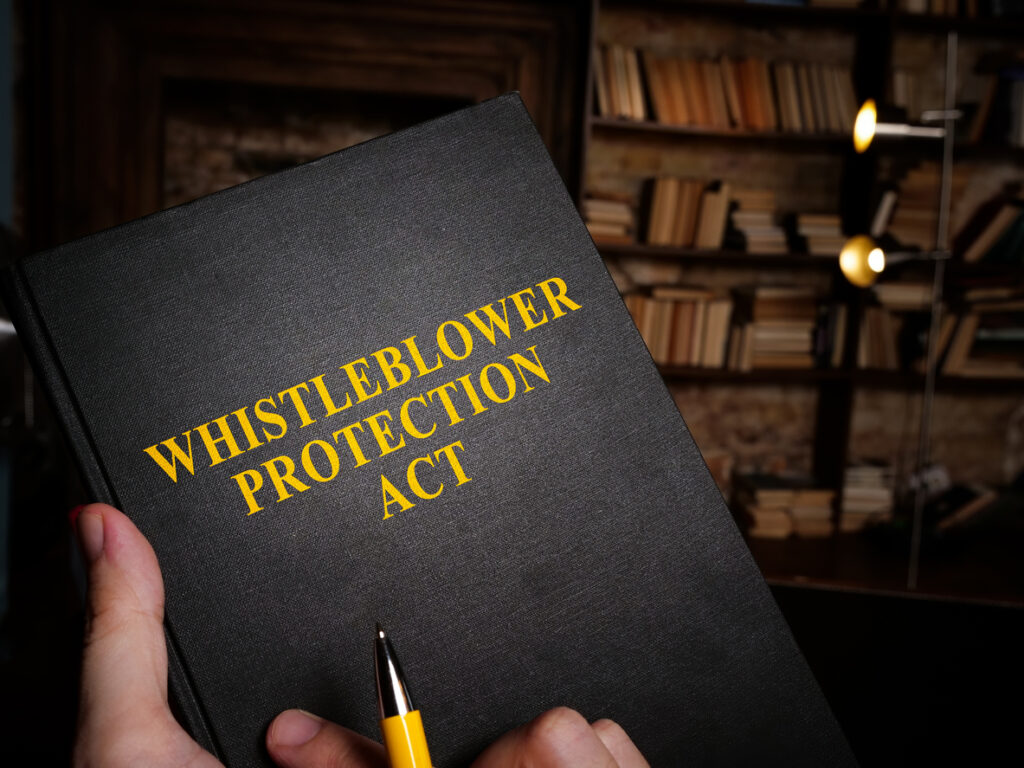In today’s fast-paced business environment, ethical concerns and the need for accountability are paramount. Employees often find themselves in situations where they witness misconduct, fraud, or violations of laws and regulations within their organizations. It is in these circumstances that the role of a whistleblower becomes critical.
The Florida Whistleblower Protection Act provides significant legal protections to individuals who report wrongdoing. Let’s review what a whistleblower is, the provisions of the Florida Whistleblower Protection Act, and explain how it safeguards both private and public whistleblowers.
What is a Whistleblower?
A whistleblower is an individual—typically an employee—who reports unethical or illegal activities occurring within their organization. This could include reporting fraud, waste, abuse, or other significant violations of laws or regulations. Whistleblowers play a vital role in promoting transparency and accountability within businesses and governmental entities.
However, bringing such actions to light often comes with risks, including the potential for retaliation from employers. This is where whistleblower protection laws come into play.
Overview of the Florida Whistleblower Protection Act
The Florida Whistleblower Protection Act (FWPA), enacted to protect employees from retaliation, provides a robust framework for safeguarding whistleblowers in both public and private sectors. Here are the key provisions of this Act:
- Protected Disclosure: The FWPA protects employees who disclose, or threaten to disclose, information regarding any activity that violates a law, rule, or regulation. This includes disclosing information about any misconduct that poses a risk to public health, safety, or welfare.
- Prohibition of Retaliation: Employers are prohibited from taking adverse employment actions against an employee who makes a protected disclosure. This includes demotion, termination, harassment, or any form of discrimination in the workplace.
- Reporting Procedures: Whistleblowers must report violations to the appropriate authorities within their organization or to governmental entities, depending on the situation. For public employees, the disclosure is typically made to their supervisor or designated authority. For private-sector employees, reporting can be made to the appropriate state agency.
- Remedies for Retaliation: If an employee faces retaliation for whistleblowing, they may seek remedies through the courts. This may include reinstatement, back pay, front pay, and damages for emotional distress.
- Confidentiality: The law also emphasizes the confidentiality of the whistleblower’s identity in cases where that identity is not necessary for the investigation of the claims.
Protections for Private and Public Whistleblowers
The Florida Whistleblower Protection Act offers protections to both public and private sector employees, reflecting the state’s commitment to upholding ethical standards and promoting accountability.
Public Sector Whistleblowers: Employees of state, county, or municipal agencies who report violations or misconduct are specifically protected under the FWPA. They can report their concerns without fearing repercussions or retaliation. Additionally, complaints related to misconduct must be reported to the appropriate authorities, ensuring a thorough investigation.
Private Sector Whistleblowers: Employees working for private companies also have protection under the FWPA. Unlike other states that may limit protections to certain categories of employees, Florida’s law offers broad protections to anyone reporting wrongdoing. However, in the private sector, whistleblowers may face unique challenges, including obstacles related to corporate culture and job security.
In both sectors, the ultimate goal of the FWPA is to create an environment where individuals feel safe speaking up without jeopardizing their careers. The law emphasizes the importance of fostering transparency and trust, which benefits both the workplace and society as a whole.
Key Differences Between Public and Private Whistleblowers
Although private and public sector whistleblowers perform the same service, there are at least two key differences in public and private whistleblower actions:
Statute of Limitations
A major distinction between public and private whistleblowers lies in the statute of limitations. In many states, public whistleblowers have a shorter window to come forward compared to those in the private sector. This compels public whistleblowers to act swiftly so that their claims can be considered and investigated.
Legal Protections and Compensation
Both groups of whistleblowers are safeguarded by laws aimed at preventing retaliation and job termination for exposing misconduct. For example, the Sarbanes-Oxley Act, enacted in response to the Enron scandal, prohibits specific unethical accounting practices and provides enhanced protections for private sector whistleblowers. These laws permit whistleblowers to report misconduct without fearing job loss and may even make them eligible for compensation for their courage.
Federal government employees are largely protected by the Whistleblower Protection Act (WPA) and the Whistleblower Protection Enhancement Act (WPEA).
How Parrish & Goodman Can Help
At Parrish & Goodman, Attorneys at Law, we understand the complexities surrounding whistleblower protections under the Florida Whistleblower Protection Act. Our experienced legal team is dedicated to protecting the rights of whistleblowers and ensuring they are treated fairly and justly. Here’s how we can assist you:
- Legal Consultation: We can provide a comprehensive assessment of your situation and advise you on the best course of action, whether you are considering coming forward or have already experienced retaliation.
- Filing Complaints: If you face retaliation, we can assist you in filing complaints with the appropriate authorities and navigating the intricacies of the legal process.
- Advocacy: We are committed to advocating for your rights and pursuing remedies available under the law to compensate for any retaliatory actions you may have experienced.
- Guidance through Legal Proceedings: If necessary, we can represent you in court to ensure a thorough hearing of your claims is conducted, working toward securing the justice you deserve.
Frequently Asked Questions (FAQs) About Whistleblower Protections
What constitutes a protected disclosure under the Florida Whistleblower Protection Act?
A protected disclosure includes reporting violations of laws, rules, or regulations that relate to public health, safety, fraud, or any misconduct within an organization.
Can I remain anonymous when reporting misconduct?
While confidentiality is emphasized, complete anonymity depends on the reporting process used and the investigation requirements. Generally, authorities may need your identity for a thorough investigation.
What types of retaliation are prohibited under the FWPA?
Retaliation can include actions such as demotion, termination, denial of promotions, harassment, or any other negative changes to employment conditions resulting from whistleblowing.
Is there a time limit for filing a retaliation claim?
Yes, specific timelines are outlined in the Florida Whistleblower Protection Act. It’s crucial to act promptly when you believe you have faced retaliation.
Do I need to have concrete evidence when I report wrongdoing?
While having evidence enhances the credibility of your disclosure, the law protects you even if you only have a reasonable belief that misconduct occurred.
Federal and State Whistleblower Attorneys
The Florida Whistleblower Protection Act serves as a vital safeguard for employees who bravely report misconduct. At Parrish & Goodman, we stand ready to support and advocate for whistleblowers in Florida, ensuring that their rights are upheld and protected at every step.
If you or someone you know may be a potential whistleblower, it is important to understand your rights and the legal protections available to you. For more information or to discuss a potential case, please contact us to schedule a no-risk, no-obligation consultation.




